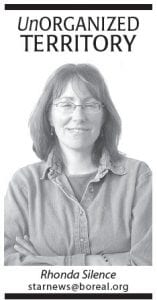Regular readers know that I end Unorganized Territory each week with a quotation from a famous or notorious or insightful person. I try to find something that “fits” just right. Sometimes a quote is found quickly in one of many wonderful quote reference books that I own. Sometimes it takes book after book or an hour or more spent surfing Internet quote pages—there are dozens of them.
Such was the case for the March 12 Unorganized Territory in which I described the wonder of having a color-changing rabbit visiting my unorganized territory yard and the joy of sharing bunny sightings with my granddaughter, AnnaBelle.
The column was one that wrote itself. Sometimes it’s easy. Sometimes the words just roll off my keyboard like marbles off a Chinese checkerboard. Especially when writing about the grandkids.
However, when the easy-to-write column was done, I was faced with the task of finding an appropriate quote. That was not so easy. I searched for grandchildren quotes but none seemed suitable. I searched for wildlife and changing seasons, nothing.
Getting slightly desperate, I searched the Internet for a “rabbit” quote. And that is where I found the very interesting Henry David Thoreau quote:
What is a country without rabbits and partridges? They are among the most simple and indigenous animal products; ancient and venerable families known to antiquity as to modern times; of the very hue and substance of Nature, nearest allied to leaves and to the ground. I decided to use the Thoreau quote, because it worked. But also because it made me laugh. I don’t think Thoreau was referring to rabbits in the same warm and fuzzy way I was. While I enjoy seeing “bunnies” in my yard, I get the feeling Thoreau enjoyed stewing rabbits on his stove.
I think the quote works on either level. And it really does make me laugh, because it reminds me of the one and only time I tasted rabbit— accidentally.
It happened when our military family lived in Germany. We went out to dinner at a lovely Gasthaus and I decided to be daring. I decided to pick something off the menu that I didn’t quite recognize—Wild Feld Hase.
I knew that “wild” in German translates to wild in English, so I knew the dish would be some sort of wild game. But I like venison and moose. I’ve eaten bison and bear and found them to be okay. I bravely ordered.
But when the gravy-covered meat arrived, it was kind of stringy and really gamey tasting. I started puzzling over what it could be. “Feld, feld, feld,” I thought, finally remembering that “feld” in German means field.
So that left just one strange word—“hase.” It seemed so familiar. Wild field “hase.” Where had I heard that before? And suddenly, sickeningly, I realized—“Oster Hase.” Easter Bunny! I was eating wild field rabbit!
Well, I had been eating wild field rabbit. I could not finish the dish, despite the delicious brown gravy intended to disguise the flavor of dead rabbit.
I still shudder at the memory. So although I agree with Thoreau on many, many, things, the idea of rabbits as “animal products” is not one of them. That man is richest whose pleasures are the cheapest.
Henry David Thoreau



Loading Comments